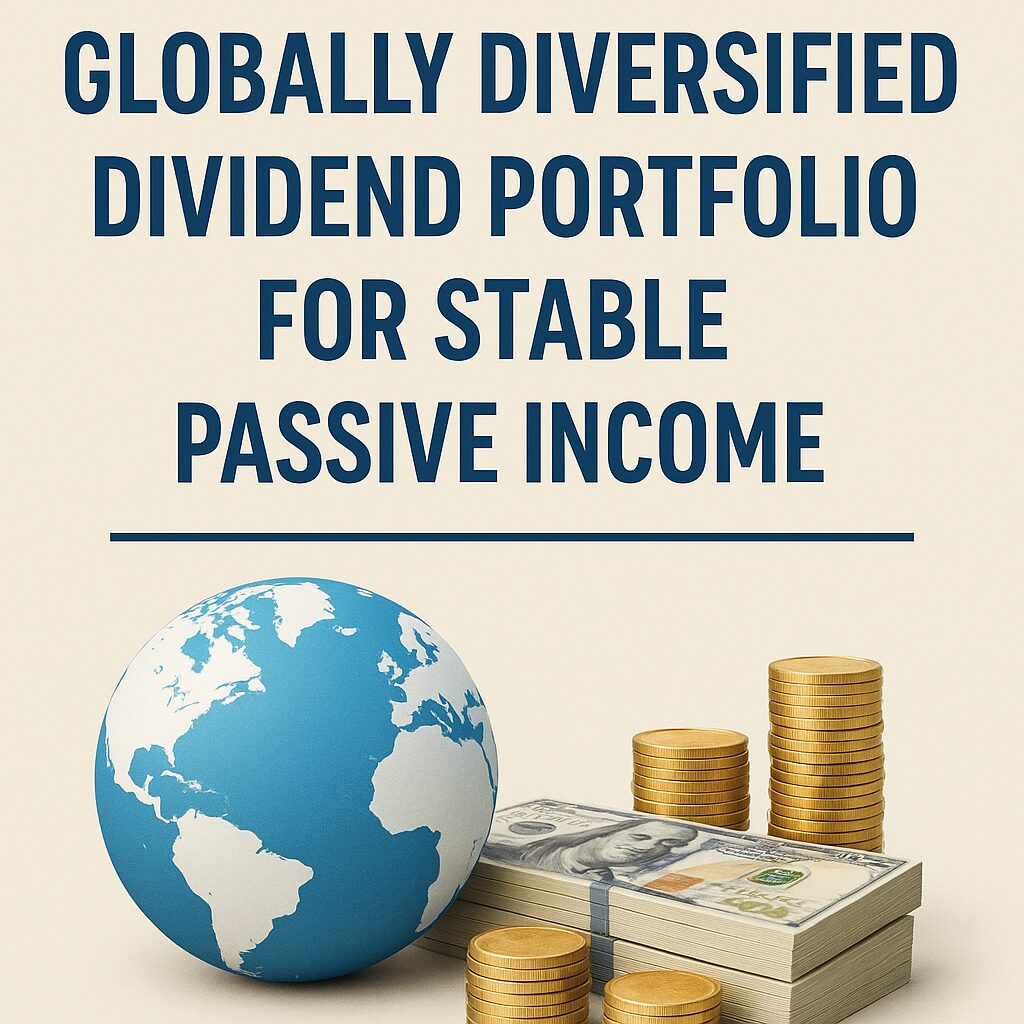If you’re serious about building long-term passive income through dividends, limiting yourself to one country—no matter how strong its economy—is a missed opportunity. Global dividend investing not only expands your reach but also provides powerful layers of income stability, currency diversification, and regional risk management. In this guide, you’ll learn exactly how to build a globally diversified dividend portfolio designed to generate stable, growing income across different markets and economic cycles.
Why Global Diversification Matters for Dividend Investors
Investing globally in dividend-paying assets allows you to:
- Avoid overexposure to any single economy or currency
- Capture higher yields from markets with stronger dividend cultures
- Offset downturns in one region with upturns in another
- Access sectors that are underrepresented in your home market
For instance, while U.S. companies like Apple and Microsoft dominate tech dividends, European firms like Nestlé or Unilever lead in consumer staples, and Asian companies such as Taiwan Semiconductor provide access to growing innovation-driven economies.
Moreover, some countries have shareholder-friendly dividend tax policies or culturally prioritize regular dividend payouts, making them especially attractive for global income seekers.
Core Elements of a Globally Diversified Dividend Portfolio
To construct a truly global dividend portfolio, you need:
- Geographic Spread
Include equities from North America, Europe, Asia, and Emerging Markets. Don’t over-concentrate in the U.S. - Currency Exposure
Your dividend income should span multiple currencies: USD, EUR, GBP, JPY, and stable emerging market currencies like SGD or TWD. - Sector Balance
High-dividend industries vary by country. In the U.S., it’s utilities and REITs; in Europe, it’s banking and industrials; in Asia, it’s telecom and infrastructure. - Payout Frequency
Some international stocks and ETFs pay monthly or quarterly. Mixing payout schedules creates smoother monthly income. - Dividend Growth vs. Yield
Blend high-yield stocks (4–7%) with dividend growers (increasing 5–10% per year) to combine stability and compounding.
Top Countries for Reliable Dividend Stocks
Here are five dividend-friendly markets to anchor your portfolio:
- United States
Known for dividend aristocrats and ETFs. Strength: consistency and strong corporate governance. - Canada
Famous for high-yielding banks, utilities, and telecom. Many stocks pay monthly. - United Kingdom
Offers high dividends from blue-chip companies like BP and British American Tobacco. - Switzerland
Tax-optimized payouts from global firms like Nestlé and Novartis. - Singapore
A hub for dividend-paying REITs and stable infrastructure plays.
You may also consider countries like Australia, Germany, or Hong Kong for additional exposure to strong dividend cultures.
Recommended ETFs and Funds for Global Income
If selecting individual stocks across continents feels overwhelming, global dividend ETFs simplify the process. Here are top picks:
- Vanguard International High Dividend Yield ETF (VYMI)
Tracks high-yielding non-U.S. companies. Broad global exposure. - iShares International Select Dividend ETF (IDV)
Focuses on companies with long-term dividend history. - SPDR S&P Global Dividend ETF (WDIV)
Offers global exposure across 100+ companies. - Schwab International Dividend Equity ETF (SCHY)
Low-fee, high-quality international dividend stock basket. - iShares Asia/Pacific Dividend ETF (DVYA)
Specializes in high-yield stocks from Asia and the Pacific.
Look for low fees, strong liquidity, and historical yield consistency when choosing ETFs.
Risk Management Through Currency and Region Balancing
Currency fluctuations can amplify or erode your dividend returns. If your base currency is USD, receiving dividends in EUR or JPY can affect real income depending on the exchange rate at the time of payout.
Strategies to manage this:
- Use ETFs that hedge currency risk
- Blend multiple currencies for natural diversification
- Rebalance regionally each year to stay aligned with macro trends
Also, monitor regional political and economic risks. For example, emerging markets may offer high yields but also higher volatility.
Tax Optimization for International Dividends
Foreign dividend income often comes with withholding taxes from the country of origin. These taxes typically range from 10% to 30% and can reduce your yield unless managed correctly.
Tips:
- Use tax-advantaged accounts (like Roth IRAs in the U.S.) where possible
- Understand your country’s foreign tax credit rules
- Choose ETFs domiciled in countries with favorable tax treaties
- Research Irish-domiciled ETFs (e.g., VWRL), which often have better withholding structures for U.S. investors
Consult a cross-border tax advisor if you plan to build a substantial international portfolio.
How to Start Building Your Global Dividend Portfolio
Step-by-step plan:
- Assess your base currency and tax situation
- Allocate across regions (e.g., 40% U.S., 30% Europe, 20% Asia, 10% EM)
- Blend individual stocks with ETFs for control + convenience
- Set income goals and dividend payout schedule
- Automate reinvestment or dividend sweeps to stable assets
- Track portfolio performance in native and converted currency
Over time, reinvest your dividends to expand your holdings, and adjust allocations as global markets shift.
Final Thoughts
A globally diversified dividend portfolio provides one of the most powerful passive income engines available to modern investors. By tapping into international markets, you can access higher yields, smoother income, and a broader foundation for long-term wealth.
Don’t let geographic borders limit your financial future. Build your dividend income across the world—and let compounding do the rest.
📌 Coming Up Next
